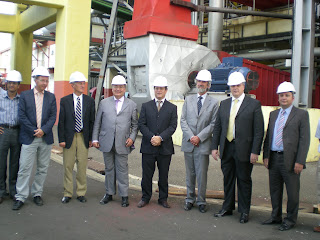On 14 July the European Union (EU) and the Republic of Mauritius signed the "Agreement between the European Union and the Republic of Mauritius on the Conditions of Transfer of Suspected Pirates and Associated Seized Property from the European Union-Led Naval Force to the Republic of Mauritius and on the Conditions of Suspected Pirates after Transfer" or in short the EU-Mauritius Transfer Agreement.
The agreement was signed by Ambassador Alessandro Mariani, Head of the Delegation of the European Union to the Republic of Mauritius, and Mrs Fong Weng-Poorun, Permanent Secretary for Home Affairs in the Prime Minister's Office. The signature took place within the framework of the ESA-IO regional strategy and action plan to fight against piracy and to promote maritime security, as endorsed by the 2nd regional ministerial conference, co-chaired by Catherine Ashton (High Representative for Foreign Affairs and Security Policy and Vice President of the European Commission) and held in Mauritius on 7 October 2010.
This Agreement defines the conditions and modalities for the transfer of persons suspected of attempting to commit, committing or having committed acts of piracy within the area of operation of EUNAVFOR on the high seas off the territorial seas of Mauritius, Madagascar, the Comoros Islands, Seychelles and Reunion Island and detained by EUNAVFOR, the transfer of associated property seized by EUNAVFOR from EUNAVFOR to Mauritius and the treatment of transferred persons.
Catherine Ashton stated "I congratulate the Government of Mauritius for joining hands in the fight against piracy and for the promotion of maritime security, in line with the regional strategy and action plan endorsed by the 2ndregional ministerial conference held in Mauritius last year. Piracy is a scourge which is affecting all countries". In Ambassador Mariani's view this signature is emblematic of the quality of the relations between Mauritius and the European Union and of the common vision of our leaders in the mutual interest of our peoples.
In parallel, the signature of two programs for additional financial support from the European Union for implementing this Transfer Agreement took place.
Addendum to the National Indicative Programme for Mauritius
First of the two additional programmes is the Addendum to the National Indicative Programme allocating to Mauritius an additional grant of EUR 3 million (approx. 120 million MUR) to be invested as general budget support. This signature took place as regards medium and long term assistance to cover further needs and to compensate, in support to the fight against poverty, the additional costs to the economy and to the Government incurred to respond to piracy. The Addendum was signed by Ambassador, Alessandro Mariani, and the former Minister of Finance, Pravind Jugnauth.
Contribution Agreement with UNODC
The second programme receiving the additional funding is the EU and UNODC (United Nations Office for Drugs and Crime)joint programme to support the trial and related treatment of piracy suspects in Mauritius.
During the negotiations of the Transfer Agreement, the EU has recognised the request for additional financial support for implementing such an Agreement and therefore made available an additional grant of EUR 1.08 million (approx. 43 million MUR ) to finance a joint EU-UNODC programme to respond to the immediate needs for initiating the prosecution of suspected pirates. This programme will be implemented by UNODC and is financed via the EU Instrument for Stability (IfS). While adapted to the specificities of the Mauritius context, there is a close correspondence with the nature of the EU IfS support already provided to Kenya and to the Seychelles Mauritius
- Legislative review, including assistance with amendments to legislation;
- Support to the Police/Coast Guard, including mentoring assistance for the police, investigative
- assistance of the police, counter-piracy training for the police and coast guard, police support for piracy investigations;
- Support for the Prosecutors and the Attorney General's Office, including the provision of legal research and materials, the preparation of a handover guidance, support for the attendance at international piracy meetings and exposure to trials in other jurisdictions;
- Support to the Courts, including the provision for supporting the attendance of witnesses, supporting the presence of interpreters, the purchase of a transcription/voice recognition system, reinforcement of court security, the purchase of video link and other court technology, provision for legal representation for suspects at trials;
- Support to the Prison Service, including preparation of a master-plan for use of the existing Mauritius prison capacity, support essential renovations and improvements of designated areas of the existing prison estate at Beau Bassin so as to allow better use to be made of existing capacity, development of legislative framework, development of strategic framework, training and assistance to prison staff and management.










